Why the sugar substitute Stevia can replace classic household sugar
How healthy is Stevia?
Stevia is a sweet-tasting plant that is processed into a healthy sweetener in many countries around the world. It is healthy mainly because it contains neither sugar nor calories.
In addition, the blood sugar level is not affected by Stevia and the teeth are protected against caries.
A life without sweets does not have to be
There is a great demand for sweet foods, but they should contain as few calories as possible. Ideally, this should also be easy on the teeth and not alter blood sugar levels.
Regular consumption should not make people ill, but rather have a positive effect on the health of the body. Just like with the sweetener Stevia.
There are now many sweeteners and sugar substitutes, but none has as many positive properties as Stevia. Moreover, most of them are not produced naturally.
The plant "Stevia rebaudiana", which comes from South America, is also called honey herb and tastes particularly sweet by nature.
Compared to our household sugar, the Stevia plant is about 30 times sweeter. At the same time, however, it contains neither calories nor sugar. The sweetness extracted from Stevia is called stevioside and has up to 450 times the sweetening power of beet sugar.
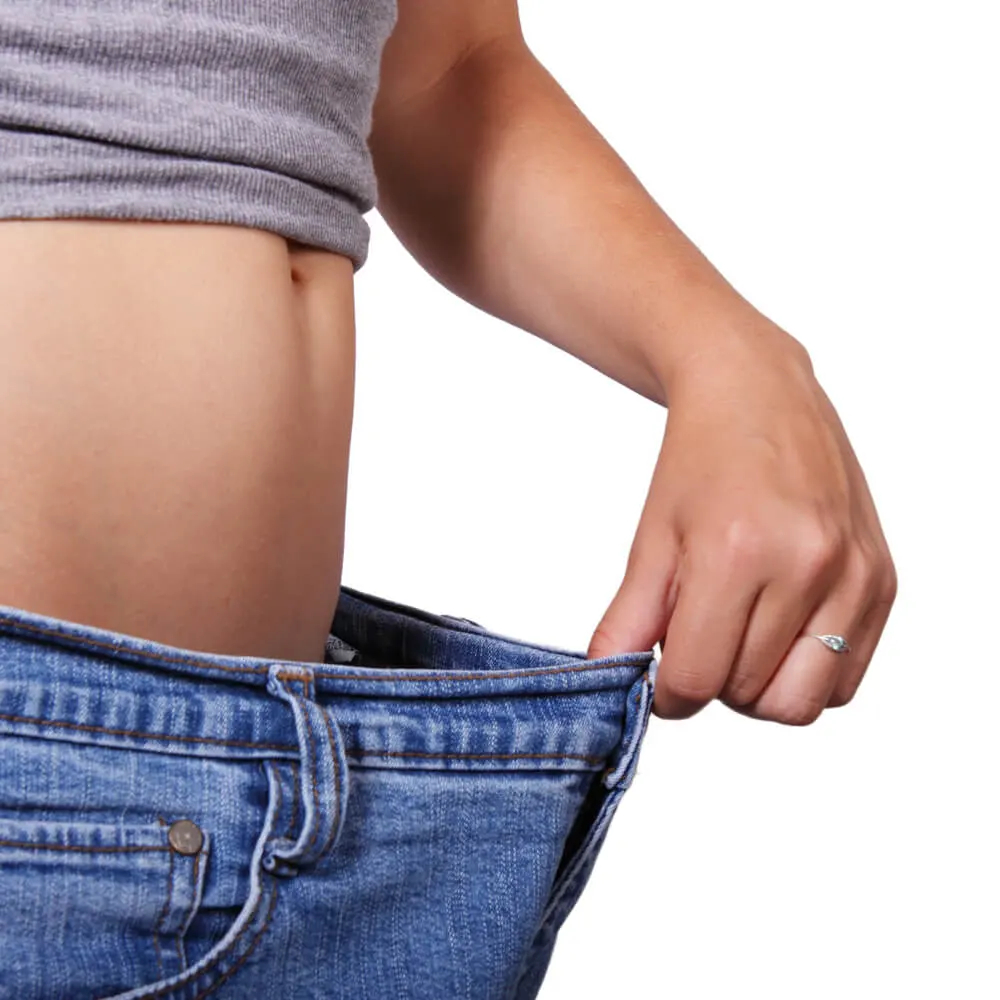

Reduce body weight with Stevia
As we all know, reducing body weight means eating fewer calories or burning more calories than you consume. Even if this is easier said than done, the path to realising this tip is not far.
The shortest answer is: with Stevia. The Stevia plant has almost no calories. For this reason, it has been used as a sweetener in Japan since the 1970s. Stevia has a 40% market share here.
Stevia does not affect blood sugar levels
The fact that Stevia does not affect blood sugar levels is another reason why losing weight with Stevia works so well. Stable blood glucose levels can be a key factor in maintaining a healthy weight. Stevioside can help to lower blood sugar levels.
100 grams of normal household sugar contain about 400 calories. Steviol glycosides are calorie-free because the body cannot digest them and excrete them unused.
This makes Stevia more than just a calorie-conscious popular sugar substitute. The natural sweetener also has no effect on blood sugar levels. Unlike normal household sugar, the intestine cannot break down steviol glycosides into usable simple sugars (monosaccharides) and release them into the bloodstream.
Therefore, blood sugar and insulin levels remain the same despite eating sweets with Stevia. For this reason, Stevia is also suitable as a sweetener for diabetics.

Prevent tooth decay with Stevia and sugar substitutes
We all know that sugar is not good for our teeth. For many people, a sugary diet has led to a very unpleasant visit to the dentist.
It is best for our teeth and our whole body to avoid sugar as much as possible. Tooth decay is caused by certain bacteria in the mouth that feed on sugar. The more food these bacteria get, the more tooth-damaging acids they secrete and cavities develop.
Most people know that sugar can damage teeth. However, many people find it difficult to give up sweets. Are Stevia and so-called sugar substitutes a substitute for dental health?What are Stevia sweeteners and sugar substitutes?
Sugar substitutes include erythritol and isomalt, for example. For the most part, they are less sweet than regular table sugar, have much fewer calories and have little effect on insulin levels.
This is why diabetics can also use these sugar substitutes. Sugar substitutes are heat-resistant and are therefore suitable for cooking and baking, for example for cakes or Christmas biscuits.
Examples of sweeteners are Stevia, saccharin and aspartame. They are much sweeter than normal sugar. Sweeteners contain almost no calories and are also good for diabetics. However, they are more difficult to dose than sugar substitutes because of their high sweetening power. They are used, for example, as sweeteners in low-calorie soft drinks.
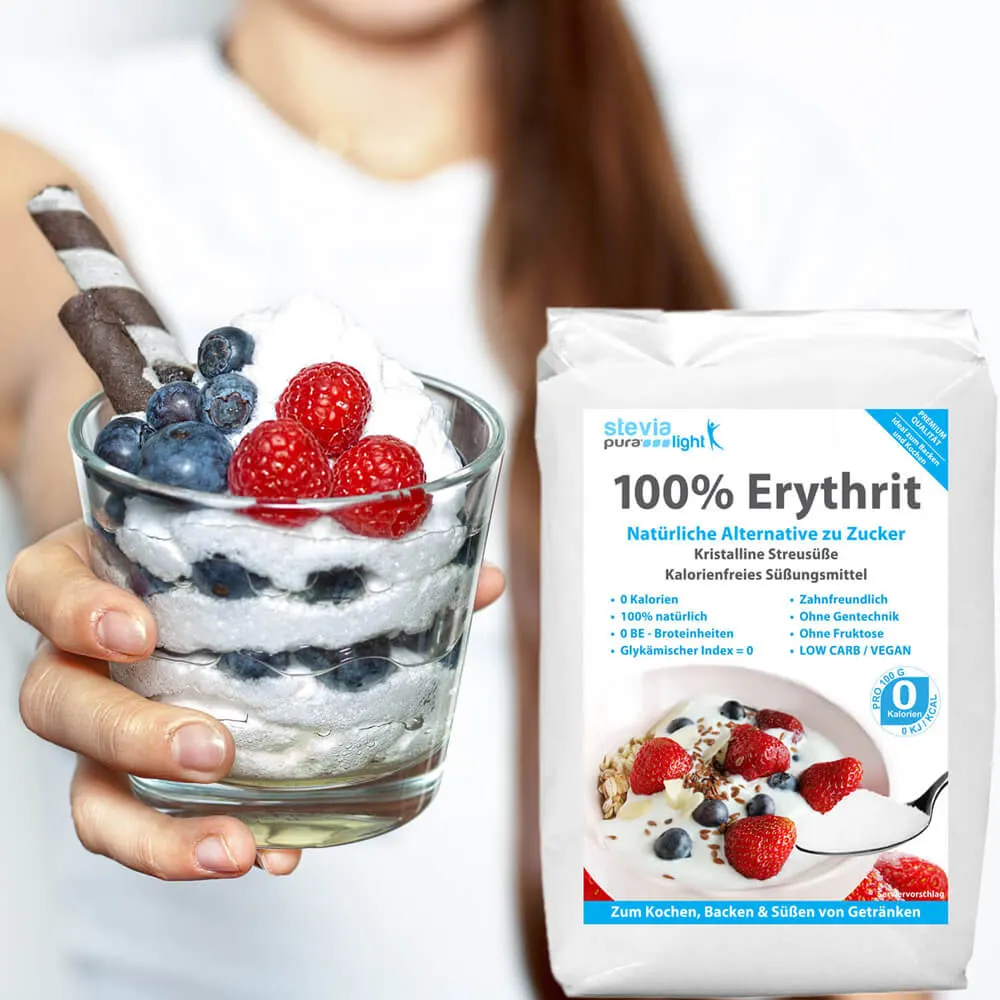
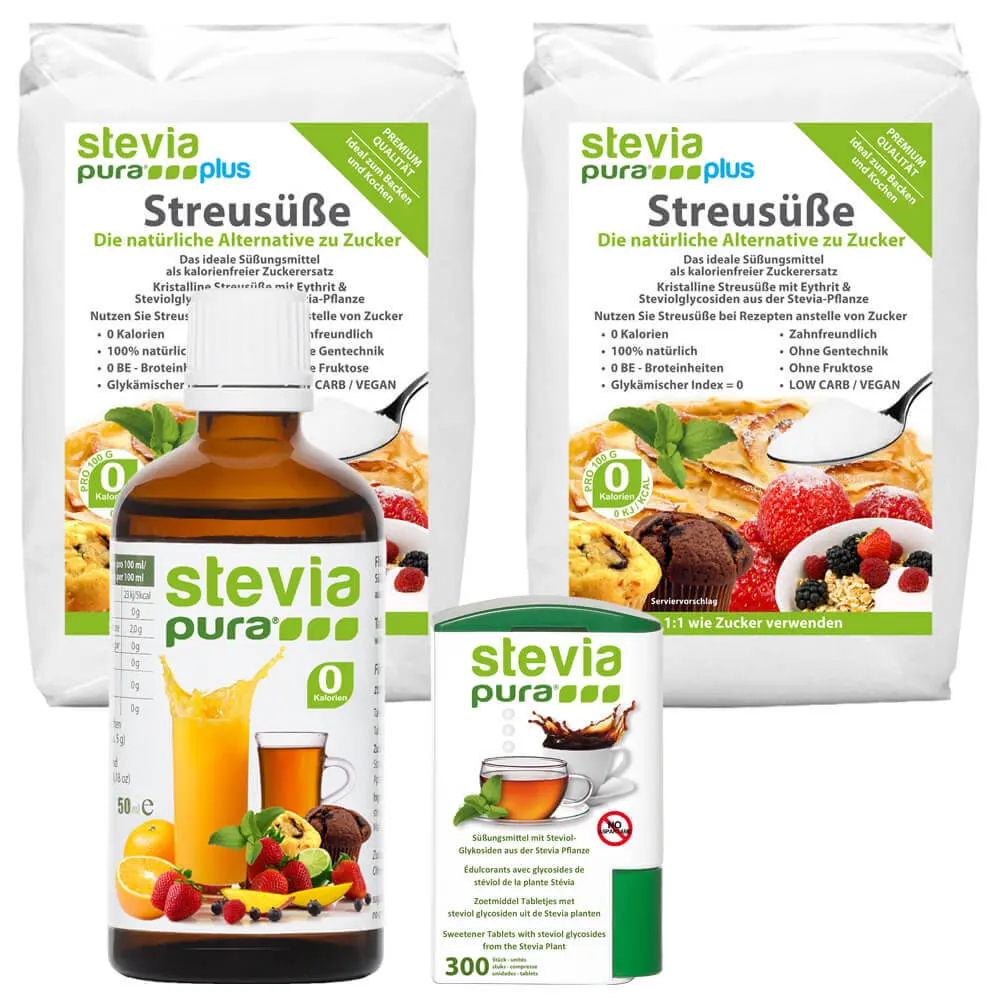
Are sugar substitutes a substitute for dental health?
Unlike conventional sugar, sugar substitutes and sweeteners neither promote plaque formation nor cause tooth decay. The bacteria in the mouth cannot metabolise these substances at all or only very slowly.
Erythritol and Stevia are excellent ways to reduce sugar consumption and prevent tooth decay without having to give up sweets altogether.
Attention, hidden sugar! | What is hidden sugar?
Food manufacturers use sugar as an additive in many products in which you would not actually expect any sweetness.
The reasons: In some foods, sugar improves the taste, the consistency and extends the shelf life. In this way, manufacturers save on often healthier and more expensive ingredients.
Of course, producers have to list these ingredients. At first glance, many consumers cannot even identify them as sugar.
Tip:
You can recognise these ingredients by the endings "-ose" or "-syrup", for example: dextrose or maltose syrup. Also, names like barley malt, skimmed milk powder, malt extract, maltodextrin, natural fruit sweetener or sweet whey powder.
Caution is advised with "hidden sugars" in these products: Crisps, fruit purees in a bag ("squeezies"), sweetened fruit yoghurt, ketchup, muesli bars, juice spritzers or dried fruit.
Many consumers do not know that sugar is also often found in products labelled "without sugar" or "sweetened without sugar".
They then find fructose (fruit sugar), glucose (grape sugar), glucose syrup, lactose (milk sugar) or maltose (malt sugar) in the list of ingredients, for example. Unlike sugar substitutes, these substances can also cause tooth decay.
Per capita consumption of sugar
The average annual sugar consumption per person in Germany is about 35 to 40 kilograms. In the USA and Switzerland, this figure is almost twice as high.
The sugar consumed is not just about the quantities used for coffee or cake batter. It also counts the sugar contained in jam, cocoa drinks, nut nougat cream, juices, soft drinks, crisps, biscuits or muesli, for example. This type of food does not show the amount of sugar.
The relief for their teeth when even a portion of the sugar consumed daily is saved becomes clear. Besides the caries-inhibiting effect of Stevia, the sweetener is also said to prevent the formation of plaque (dental plaque).
Can Stevia lower blood pressure?
Onakpoya & Heneghan, University of Oxford | Department of Primary Care Health Sciences reports research showing that steviosides can lower high blood pressure.
Recently, the news channel CNN reported that fructose, which is found in many foods, has been linked to an increased risk of high blood pressure.
To increase the risk of high blood pressure by this percentage, it is enough to drink two and a half cans of a fructose- or sugar-sweetened soft drink.
So it would be enough to at least sweeten drinks like coffee, tea or homemade lemonade with Stevia to protect blood pressure in the long run.Using Stevia correctly
There are many foods that can easily be sweetened with Stevia instead of sugar or synthetic sweeteners. One example is homemade tomato sauce.
It is just as easy to make low-calorie lemonade. Just squeeze some lemon juice into a glass of water. To give the drink the appropriate sweetness, add a little Stevia.
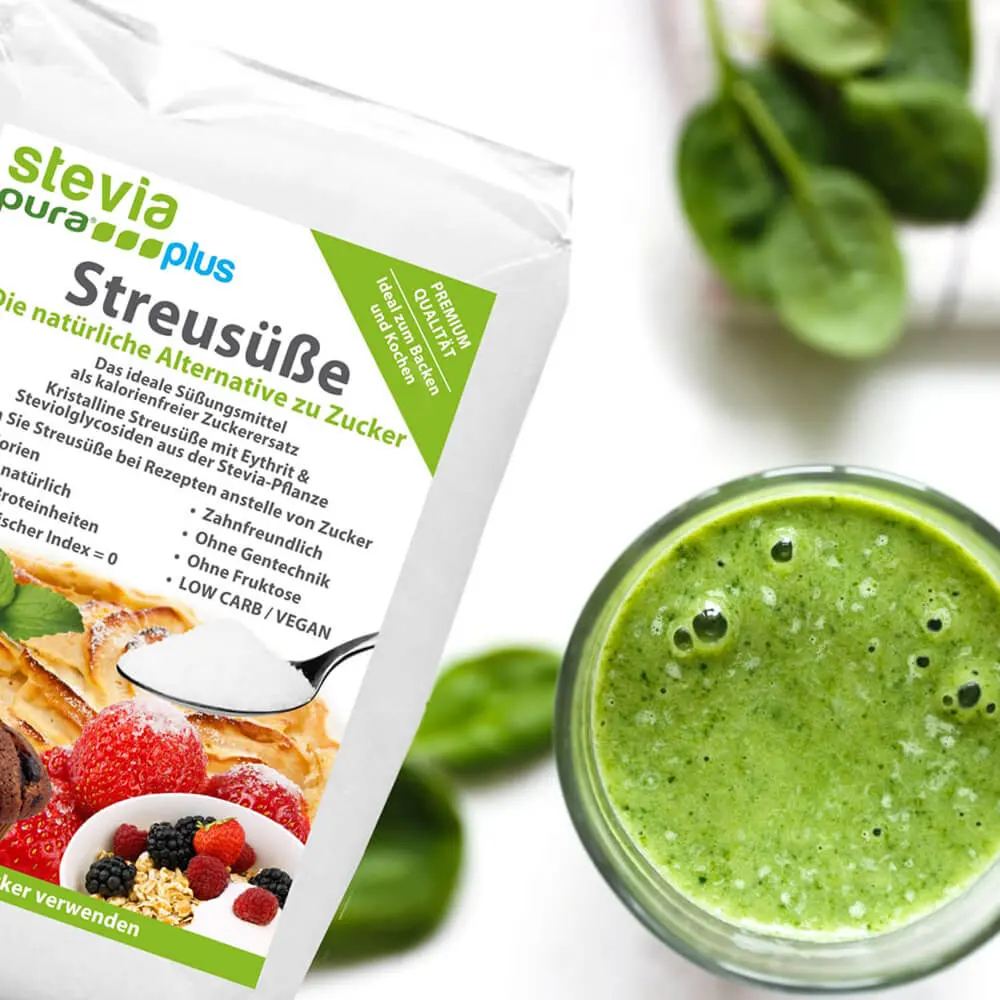
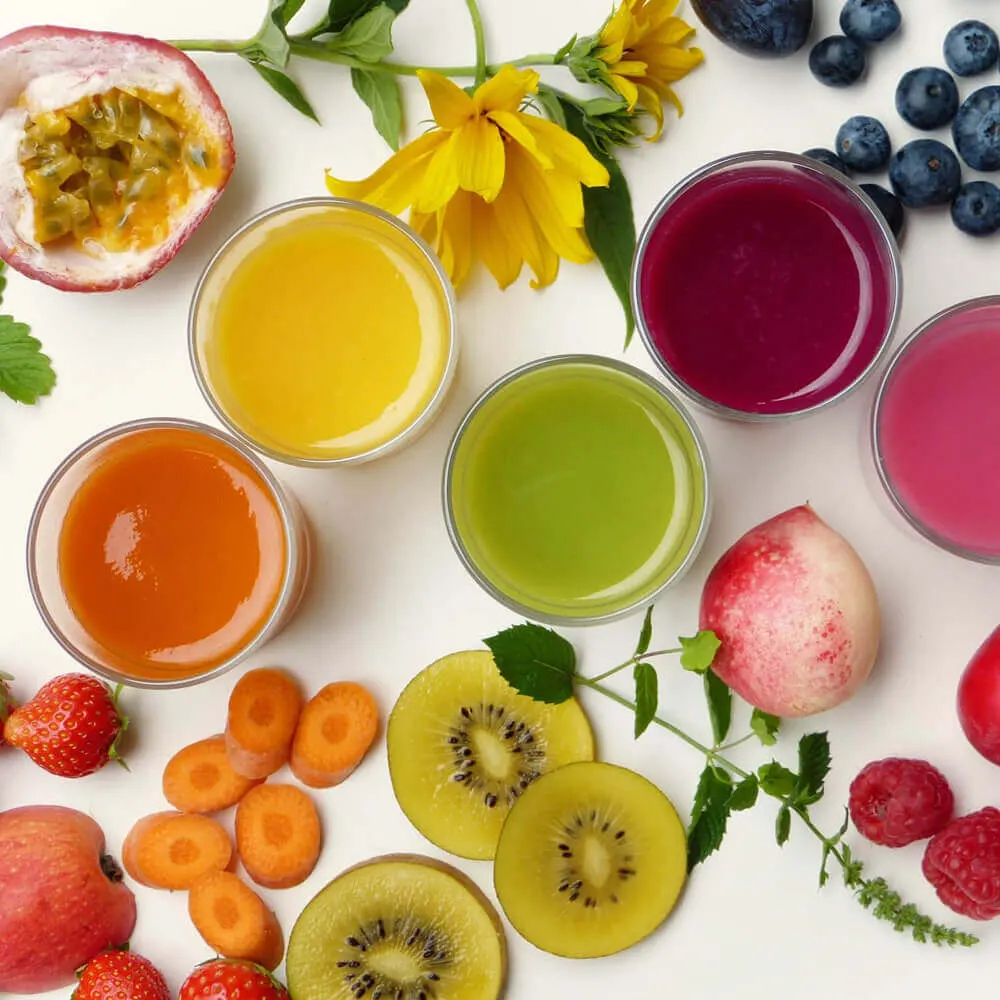
Too much sugar in many smoothies
Ready-made smoothies often contain a lot of hidden sugar in the form of fructose and sugar, some even more than cola. Stiftung Warentest has put smoothies under the microscope. Magazine "test" issue 3/2021.
Smoothies can also be made sugar-free. They not only provide the body with many vital substances, but also have a satiating effect. Thus, smoothies can prevent hunger attacks quite naturally.

 German
German Dutch
Dutch French
French Italian
Italian Portuguese
Portuguese Spanish
Spanish
